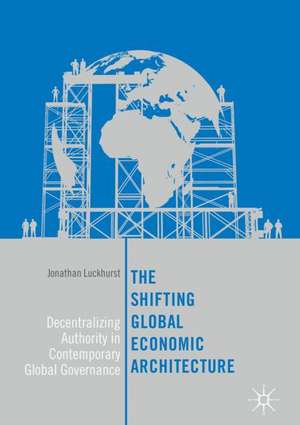The Shifting Global Economic Architecture: Decentralizing Authority in Contemporary Global Governance
Autor Jonathan Luckhursten Limba Engleză Hardback – 18 oct 2017
| Toate formatele și edițiile | Preț | Express |
|---|---|---|
| Paperback (1) | 683.98 lei 6-8 săpt. | |
| Springer International Publishing – 18 mai 2018 | 683.98 lei 6-8 săpt. | |
| Hardback (1) | 689.27 lei 6-8 săpt. | |
| Springer International Publishing – 18 oct 2017 | 689.27 lei 6-8 săpt. |
Preț: 689.27 lei
Preț vechi: 810.90 lei
-15% Nou
Puncte Express: 1034
Preț estimativ în valută:
131.91€ • 137.42$ • 109.68£
131.91€ • 137.42$ • 109.68£
Carte tipărită la comandă
Livrare economică 08-22 februarie 25
Preluare comenzi: 021 569.72.76
Specificații
ISBN-13: 9783319631561
ISBN-10: 331963156X
Pagini: 306
Ilustrații: XV, 306 p. 11 illus.
Dimensiuni: 148 x 210 mm
Greutate: 0.54 kg
Ediția:1st ed. 2018
Editura: Springer International Publishing
Colecția Palgrave Macmillan
Locul publicării:Cham, Switzerland
ISBN-10: 331963156X
Pagini: 306
Ilustrații: XV, 306 p. 11 illus.
Dimensiuni: 148 x 210 mm
Greutate: 0.54 kg
Ediția:1st ed. 2018
Editura: Springer International Publishing
Colecția Palgrave Macmillan
Locul publicării:Cham, Switzerland
Cuprins
1. Introduction: The Shifting Global Economic Architecture .- 2. Global Economic Governance Since the Twentieth Century .- 3. Global Economic Governance Since the Global Financial Crisis .- 4. From Deregulation and Market Efficiency to Sustainable and Inclusive Growth .- 5. Globalization, Inequality, and Challenges to Free Trade .- 6. The Growing Sustainable Development Consensus .- 7. Shifting Authority of Actors in Global Economic Governance .- 8. Fragmentation or Integration of Global Economic Governance .- 9. Conclusion: Decentralizing Global Economic Governance.
Notă biografică
Jonathan Luckhurst is Associate Professor of International Relations at the Center for North American Studies of the Pacific Studies Department, University of Guadalajara, Mexico.
Textul de pe ultima copertă
This book analyzes the shifting global economic architecture, indicating the decentralizing authority in global economic governance since the Cold War and, especially, following the 2008-09 global financial crisis. The author examines recent adjustments to the organizational framework, contestation of policy principles, norms, and practices, and destabilizing actor hierarchies, particularly in global macroeconomic, trade, and development governance. The study's ‘analytical eclecticism’ includes a core constructivist IR approach, but also incorporates insights from several international relations theories as well as political and economic theory. The book develops a unique ‘analytical matrix’, which analyzes effects of strategic, political, and cognitive authority in the organizational, policy, and actor contexts of the global economic architecture. It concludes that, despite concerns about potential fragmentation, decentralizing authority has increased the integration of leading developing states and new actors in contemporary global economic governance.
Jonathan Luckhurst is Associate Professor of International Relations at the Center for North American Studies of the Pacific Studies Department, University of Guadalajara, Mexico.
Caracteristici
Analyzes the international effects of the 2008 global financial crisis on economic policy and governance Considers how global economic governance can be more adaptable and better suited to the policy challenges of the twenty-first century Draws upon various social-scientific research fields and methods to present the reader with a thorough exploration of the topic
